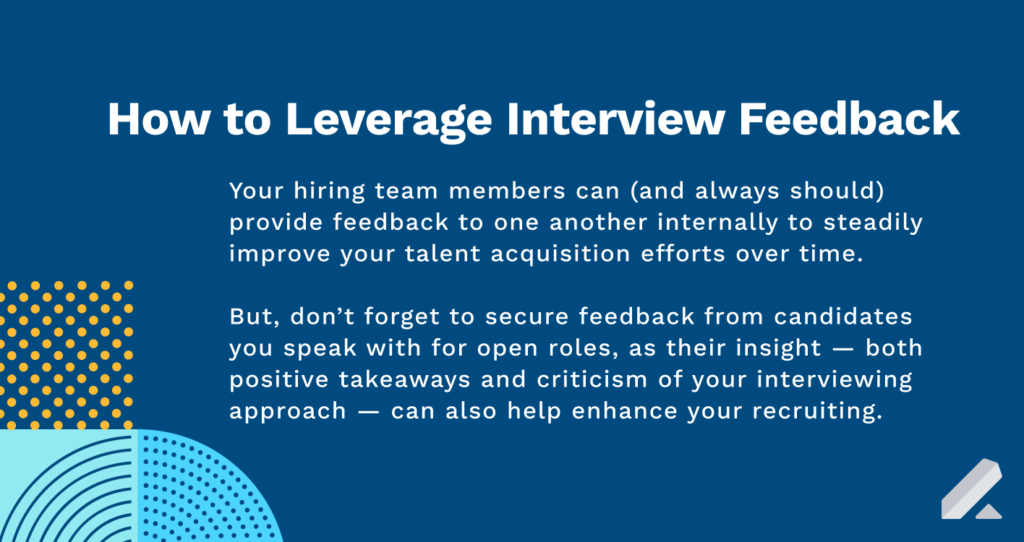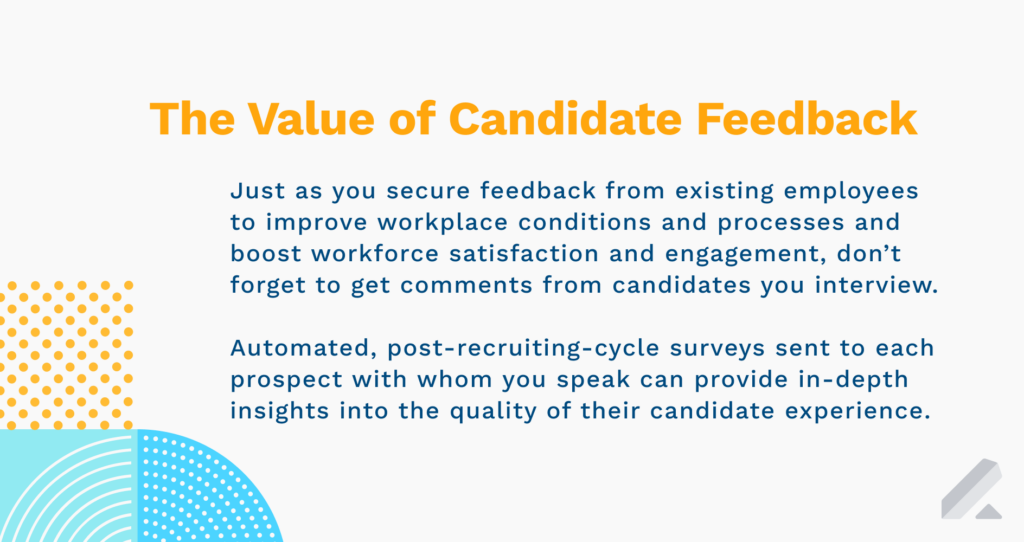Documenting interview feedback from your internal hiring team members — ideally, in an applicant tracking system (ATS) used by all recruiters and hiring managers — is a crucial element of the recruitment process. And one that can help boost your interview performance.
Simply put, your interview panelists’ evaluations help identify each candidate’s strengths and weaknesses so you can select the best job seeker for a given role.
But, many TA teams stop there.
That is, they don’t use candidates’ comments (both negative and positive interview feedback) to elevate their recruiting. In turn, these employers miss the opportunity to use these criticisms and notes to further augment their hiring efforts.
So, if your org doesn’t reach out to candidates after each hiring cycle, it’s time to start collecting and leveraging their effective interview feedback to refine your TA approach.
From your communication skills, to the personnel makeup of your interview panel structures, to how many and the types of interview stages you use in your hiring cycles.

3 ways to best leverage interview feedback
Taking a more strategic approach to using and collecting interview feedback can help you and your recruiting staff improve candidate conversions, keep your talent pipeline full, and continually improve your recruitment process.
Here’s how you can improve your interviewing approach.
1) Improve your team’s candidate “close rate” with timely internal feedback
Top-tier talent is in high demand. (And not often on the market for long.) If you move too slowly, your top-choice candidates may be scooped up by competitors and you’ll have to begin the recruitment process over with a new slate of candidates.
If you want to win these coveted candidates for your team, you must quickly collect internal feedback (i.e., interview panelists’ general thoughts and specific scores for prospects based on structured interviews) so you can make timely hiring decisions and job offers.
The best way to secure this comprehensive feedback in a timely manner?
Encourage interviewers to submit candidate assessments right after each interview. (That is to say, while their chats with prospective hires are still fresh in their minds.)
Then, build off the excitement and momentum of the recruitment process by submitting a candidate offer as quickly after your final job interview as you can.
Include positive feedback from your team to explain to the candidate why you’re excited to have them on board (e.g., “They have the right technical skills for X role”).
By doing so, you become more likely to extend offers to target prospects before competitors do. Moreover, you’ll also impress them with the bespoke candidate experience provided — and, in turn, increase your chances of job offer acceptance.

2) Share your collective interview feedback with passed-on candidates
Most candidates won’t be hired. That’s the nature of the job. But, many prospects you put the time and effort to speak with but pass on could be a good fit for a future job.
When you decide not to move forward with a given candidate, it’s important to notify them why that’s the case. Ideally, via an email shortly after you hire a candidate that features specific reasons why you went with that other person for the position.
“An open and honest approach to the hiring process will also speak to positive work culture, improving businesses’ reputations with rejected candidates and their networks,” Insperity Managing Director, Client Implementation Niki Jorgensen recently shared with Forbes.
Informing candidates of your decision as quickly as possible post-interview and providing them with detailed, constructive feedback helps you provide a great candidate experience.
Candidates can use your feedback to improve their performance in future interviews, and may even improve upon skills they lacked so they can re-apply to your company in the future.
A recent candidate experience report from The Talent Board found that when job prospects received feedback, their willingness to refer other candidates increased by 24%.
Moreover, their willingness to improve their relationship with the employer rose 36%.
You obviously want every candidate in your talent pool to consider your company for future opps and speak highly of your org with their networks.
Providing this feedback will help you enhance your employer brand (i.e., public perception) and keep your talent pipeline full of qualified folks who had a good recruitment experience with your business previously for future roles.

3) Allow job prospects to share their thoughts on your recruiting approach
Recruiting is a two-way street. Internal feedback isn’t the only interview feedback that matters.
A top way to improve your recruitment process and refine your interview skills is to ask prospects (rejected candidates you ‘archive’ and those you hire) for their feedback too.
Following each interview process, send a feedback form (i.e., a candidate experience survey) to each job seeker you interview to discover opportunities to improve your work.
Some of the most important candidate feedback questions to ask in said surveys include:
- How satisfied or dissatisfied are you with your interviewing experience?
- How satisfied or dissatisfied are you with our recruiting process comms?
- What suggestion(s) would you make to improve our interview process?
If preferred, you can even have free-form, open-text fields in CX surveys. For instance, you could ask a recently engaged job seeker to elaborate on a specific facet your interviewing (e.g., certain interview stages) or even the structure of and language included in your job listings.
(Just be sure to mandate these responses are no longer than 100 words or so. More extensive answers are certainly fine, but brevity forces candidates to get to the point.)
Take note of trends you see in candidate interview feedback. Then, create action plans to continually improve your hiring process.
By testing new (but proven) recruitment strategies and tactics, you will improve your candidate experience and the process by which you screen talent.
Again, you want every candidate to think highly of your org so you can maintain a strong employer brand and keep your talent pipeline full. Collecting and acting upon candidate feedback can help you accomplish that. (And, in turn, have silver-medalists you can revisit.)
The CX study from The Talent Board found that when candidates were invited to share their feedback after an interview, they were 74% more likely to refer other prospects.
Download our Structured Hiring 101 eBook to learn how you can leverage internal and external interview feedback into your org’s recruiting, hiring, and onboarding efforts.



